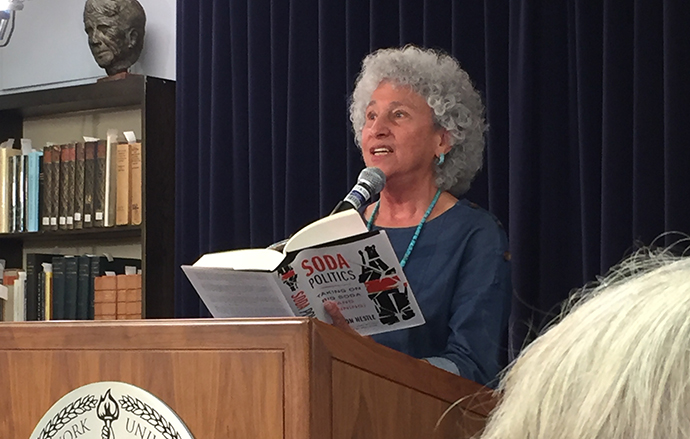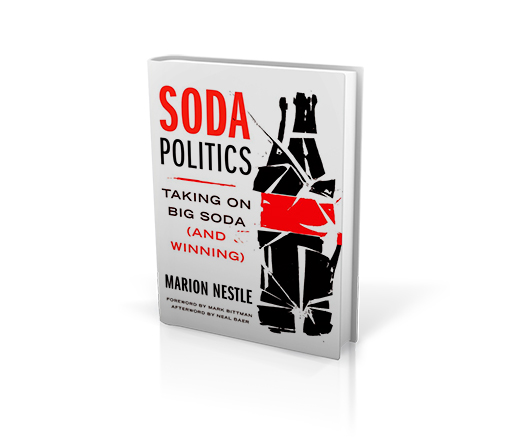Enlightened Eaters: Soda Straight Talk with Marion Nestle
Maggie Borden
Maggie BordenOctober 09, 2015

Describing JBF Award winner Marion Nestle as a titan in the field of food advocacy and policy is far from exaggeration. The Paulette Goddard Professor in the department of nutrition, food studies, and public health at New York University has brought public awareness to a wide range of issues, from the influence of the food industry on government policy, to food safety, pet food, and beyond. As Mark Bittman writes in the foreword to her latest book, Soda Politics: Taking on Big Soda (and Winning), “There is not a better-educated…and more principled person in her field.”
Earlier this week, our Enlightened Eaters program played host to Nestle as she introduced audiences to her new book and took questions. Held at the NYU Fales Library, which holds America’s largest cookbook collection (at 60,000 titles, due in part to Nestle’s efforts), the sold-out event could not have been more perfectly timed, given the recent spate of news surrounding the industry. As Nestle put it, “I think I've been scooped by the New York Times!”
Read on for some of our favorite quotes from the evening:
1) "Soda is, in terms of advocacy, low-hanging fruit. It's sugar and water and nothing else."
2) "Soda consumption is falling in the United States. This did not happen accidentally. As any soda company executive will tell you, advocacy is the number one enemy of soda profits. Declining soda sales are a result of effective food advocacy, and provide a model for other social changes."
3) "I'm trying to foment a revolution with this book."
4) "We’re dealing with an industry that's schizophrenic. On the one hand, it's all happiness and love and deep emotional moments of joy (with a Coke in hand), and on the other hand it's working hard in Congress to make sure there's nothing to stop the company from selling its products over and over again."
5) "I went to Coca-Cola World last week. The tour starts out with a movie that is so deeply emotional that there wasn't a dry eye in the audience, including mine. You then go out and see how Coca-Cola is marketed, the history of the product, and then you taste 50 to 60 products from around the world. No where in Coca-Cola World is there a word about obesity or type 2 diabetes. You don't see anything about the company's marketing to children, to African Americans, Hispanics, low-income individuals, or people in developing countries. And that's what this book is about, and how advocacy is trying to fight back on some of these things."
6) "I thought the [NYC] 16-ounce soda cap was too high: they should have capped it at 8 ounces. But the soda industry treated it like Armageddon."

7) "Soda companies are using the playbook of the cigarette companies. While sodas aren't cigarettes, it's still corporate behavior that requires much much more attention than it's gotten in the past."
8) "Young children drink so much soda in this country that the Department of Agriculture can measure the amount of soda drunk by children ages 2 to 5."
9) "Only half of the population of this country drinks soda, so that means that half of the country is drinking a lot more than those that don't. The average consumption in the U.S. per capita is 10 to 12 ounces, and that means men, women, and little tiny babies."
10) "Sodas were 6 1/2 ounces when I was a kid—that was so not a problem—and they were a rare treat. It was only much later when companies started marketing much larger portions."
11) "It's the sugar that's the issue. The amount of sugar in sodas is staggering. A 12-ounce soda has 10 teaspoons of sugar in it—it's a glucose tolerance test! And people have no idea it's in there, since you can't taste it."
12) "Soda companies are looking as hard as they can for an artificial sweetener that will taste good without getting people's chemical antennae up."
13) "Soda companies are not social service agencies, and to expect them to be doesn't make sense. But they can't market themselves as wellness companies, either."
14) "I want them to stop marketing to children at all, in any way. In fact, most of what I want them to do begins with the word 'stop.' I also want them to stop fighting public health initiatives."
15) "Go out and advocate. It works!"
--
Learn more about the James Beard Foundation's Enlightened Eaters program.







